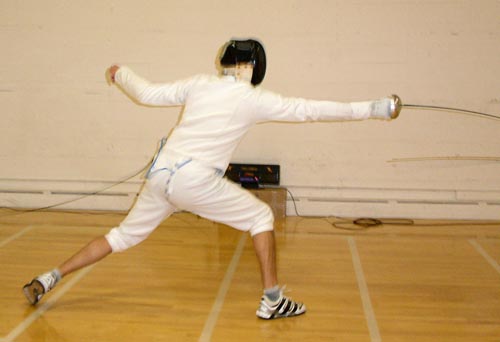
Sports
- The Outdoor Program helps people plan adventures.
- Adam Lake uses fencing to bring people together.
- Win or lose, the Pit Crew keeps Mac Court shaking for the Ducks.
- Tearing at jerseys and slamming into each other. It's women's rugby.
Changes
- A Taiwanese student finds adjusting to a foreign culture challenging.
- A close-up look at the ASUO president.
- A senior's abrupt transition to Eugene after Hurricane Katrina.
Arts
- A ballroom dance club president wears many hats and makes them too.
- Whether composing or jamming on his mandolin, Jesse Jones shares his love of music.
- Non-traditional African dance brings a new sense of community.
- The Student Fibers Guild proves that knitting isn't just for old ladies anymore.
- Halo Jones' music and art expresses his dark and light sides.
- A musician, student, activist and artist.
- For Ashley Maury, jewelry is more than decorative.
- A student TV show features news, sports, drama and comedy.
- A printmaking student goes beyond the studio and into the city.

When he took over the club, Lake brought his competitive spirit with him.
“If Adam weren’t here, we wouldn’t be going to tournaments and getting medals,” Leary said.
In the 2004-2005 season the club won 22 medals; nine gold, six silver, and seven bronze. They competed in 18 tournaments. Lake said club members go to one tournament every two weeks, on average.
“We’re as strong as any other club in the Pacific Northwest,” said Lake.
|
Lake, Leary and Conner all attained the American Fencing Association’s highest competitive rating, an A, since Lake began coaching. A fencer begins competing in the Un-rated category. From there he or she works his or her way up in rating from E to A alphabetically. A fencer works his or her way up in the rating system by beating others of the same level in bouts at tournaments.
Conner said he learns more at tournaments than anywhere else. “It helps your technique on the fly,” he said. “You get really quick feedback. It’s a good testing ground. You find out pretty fast what works and what doesn’t.”
While volunteering as the coach, Lake worked to make the club more independent. The former coach had worked with the Eugene Fencing Club and coached in a similar style. But Lake had his own style of teaching, and he wanted fencers to know that.

Lake thrusts with an attack during practice. |
“I wanted to establish us as our own club,” he said. “It took one year to break with the Eugene Fencing Club.”
In addition, he worked to bridge a gap created with U of O’s fencing class. Lake said that Sean Hayes, the teacher of the class, had had a falling-out with the coach of the Eugene Fencing Club. Since Lake briefly trained with the city’s club, Hayes believed that Lake was associated with the club. But Lake wanted to prove himself to Hayes.
“It took my registering for his class to convince him we were different,” Lake said. By taking the course, Lake established a relationship with Hayes. Afterward, Hayes referred students to the club for advanced training.
“Adam's a great guy and I have really enjoyed getting to know him better,” Hayes, who is currently teaching in Spain, wrote in an e-mail interview. “It's been great to have him in class . . . It's also nice to have a rapport with the club coach, so I can feel comfortable about sending my students to the club, and know that they're going to get a good experience.”
“I feel like I’ve done more for the team politically,” Lake said. “I keep people interested.”
For his fencing future, Lake hopes to find someone to replace him after he finishes his degree next year.
But graduating won’t stop Lake from fencing.
“He doesn’t fence to be the best,” Leary said. “He considers it a passion.”
“Everything I do is because I enjoy it,” Lake said. “I’m never going to be the world champion. There’s always going to be someone better than me. I just fence because I like it. I want to be coaching in my 80s.”
